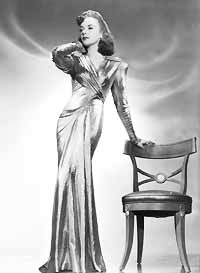Ida Lupino, Actress
By Charles Nafus, Fri., Oct. 2, 1998
 Born in war-ravaged London in 1918, she quickly chose to follow the Lupino family's theatrical tradition of three centuries. Ida's father was a popular music hall entertainer and her mother had once been billed as "the fastest tap dancer alive." When Ida was 10, her father built her a theatre with lights, curtains, and 50 seats and tutored her in the adult roles of the dramatic classics.
Born in war-ravaged London in 1918, she quickly chose to follow the Lupino family's theatrical tradition of three centuries. Ida's father was a popular music hall entertainer and her mother had once been billed as "the fastest tap dancer alive." When Ida was 10, her father built her a theatre with lights, curtains, and 50 seats and tutored her in the adult roles of the dramatic classics.
In 1932, the 14-year-old got the title part in Alan Dwan's film Her First Affaire. With bleached hair and arched eyebrows, she was quickly on her way to becoming "the English Jean Harlow." A series of other British films followed at breathtaking speed, mainly with Lupino sulking in the ingenue roles. Inevitably Hollywood summoned.
Far too sophisticated to play the title role in Paramount's projected Alice in Wonderland, Lupino was thrust into 11 forgettable movies during the next four years. At the age of 18, even though she was making $1,750 per week and living quite comfortably, she walked out on contract renewals. For the next 1 1/2 years she remade herself, slimming her 5'4" frame down to 100 pounds, returning her hair to light brown, and getting rid of the heavy makeup of the Thirties. She also married for the first of three times.
An appearance on Orson Welles' radio program secured her the part of a terrified young woman in The Adventures of Sherlock Holmes. Still desperate for a role which would reveal her acting abilities, Lupino stole a copy of the proposed screenplay for The Light That Failed (1939), memorized the part of the brash cockney streetwalker, burst into producer-director William Wellman's office, and forced him to watch her do a scene. She got the part. The New York Times praised the "little ingenue [who] suddenly bursts forth as a great actress."
The next decade would provide Ida Lupino with a wide range of characters to portray. Often found at the low end of the economic scale, Lupino's women of the early Forties included a dime-a-dance girl who would appreciate just a little bit of kindness from a man (High Sierra), a prostitute on the lam (The Sea Wolf), maids, a waitress, a miner's wife who claws her way up the economic ladder by pushing her talented sister (The Hard Way), an abused daughter with a clubfoot, an antique dealer's assistant who becomes the socialist Cinderella of wartime Poland (In Our Time), and Emily Brontë (Devotion). The only rich women she played in this period were the ruthless femme fatale of They Drive by Night and a rich girl helping the war effort (Pillow to Post).
In the postwar period, among other roles, she played a barroom singer in both The Man I Love and Roadhouse. Late Forties nightclub "canaries" had a right to be world-weary even if their disappointment was fueled by lost love rather than headlines. No one could play that role better than Lupino with her by-then tobacco-roughened voice, offbeat beauty, excellent piano skills, and eyes full of irony, sorrow, and sparks of "I've seen and heard it all, buster." But there is always a hint that her eyes might glisten again for the "right" man. When she finally allows herself to fall for a burnt-out piano player/composer in The Man I Love, he warns her, "I'll make you sing the blues." "I'll take that chance," is her fateful reply. In her tough-girl roles she usually required 15-20 changes of clothes (gold lamé, even in black-and-white cinematography, did a lot more for her than it would for Elvis), waited for her cigarette to be lit by the "gentleman" at the bar, guzzled vodka or scotch without ever getting drunk ("I'm sorry I left a good drink to come up here"), and gave men fond memories ("She reminds me of the first dame that ever slapped me"). Fortunately, few of her characters got slapped around, but when they did, she usually melted into the brutalizer's arms and sealed her fate with a 4 1/2-second kiss. Male-female relations for several generations were wounded by such images. Frequently, her main guy got killed or arrested, committed suicide, or went away. Only seven times did they stick around to marry her. Lupino's women ended up insane, with the good guy, dead from suicide or disease, rescued, or alone. In the films which she directed from 1949 to 1953 she was able to explore the lives of other kinds of women.
The Fifties brought victim roles, including a blind woman alone with a brutal city cop (On Dangerous Ground), a widow terrorized by a handyman (Beware, My Lovely), and the second wife of abigamist (The Bigamist). After returning to a third portrayal of a singer in Private Hell 36, she gave her last great performance in The Big Knife (1955) as the strong-willed, estranged wife of a major film star struggling with his former idealism.
Smelling the rotting flesh of the studio system, Ida Lupino had the talent and energy to go into television and film directing at the very time that Hollywood was turning its back on her and so many actresses of her generation. In her penultimate film, Food for the Gods (1976), she was bitten by large worms and devoured by a gigantic rat, a useful metaphor for Hollywood. At least she was able to thrive within the beast for over 40 years.
Charles Nafus is a professor of Radio-Television-Film at Austin Community College and a board member of the Austin Film Society.






